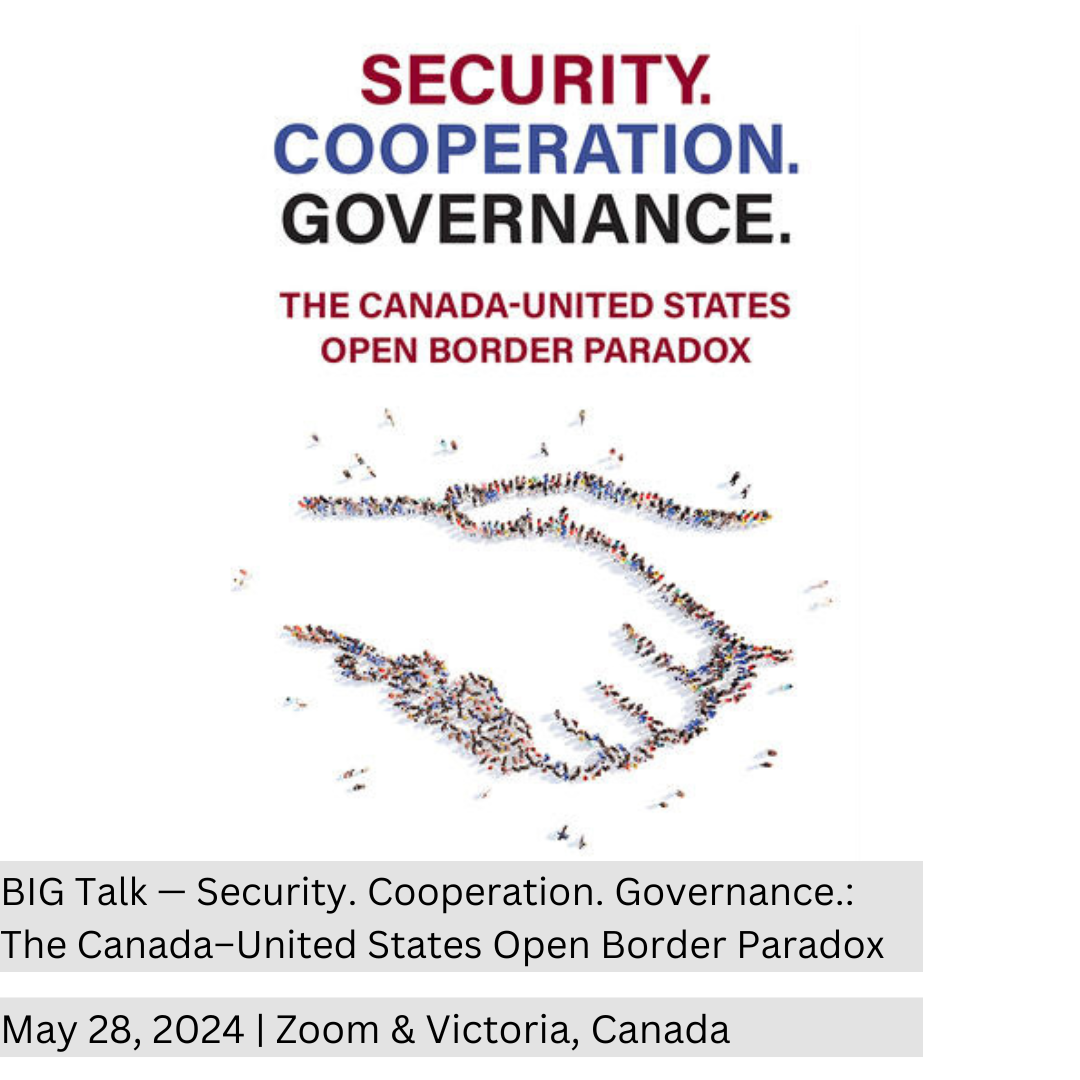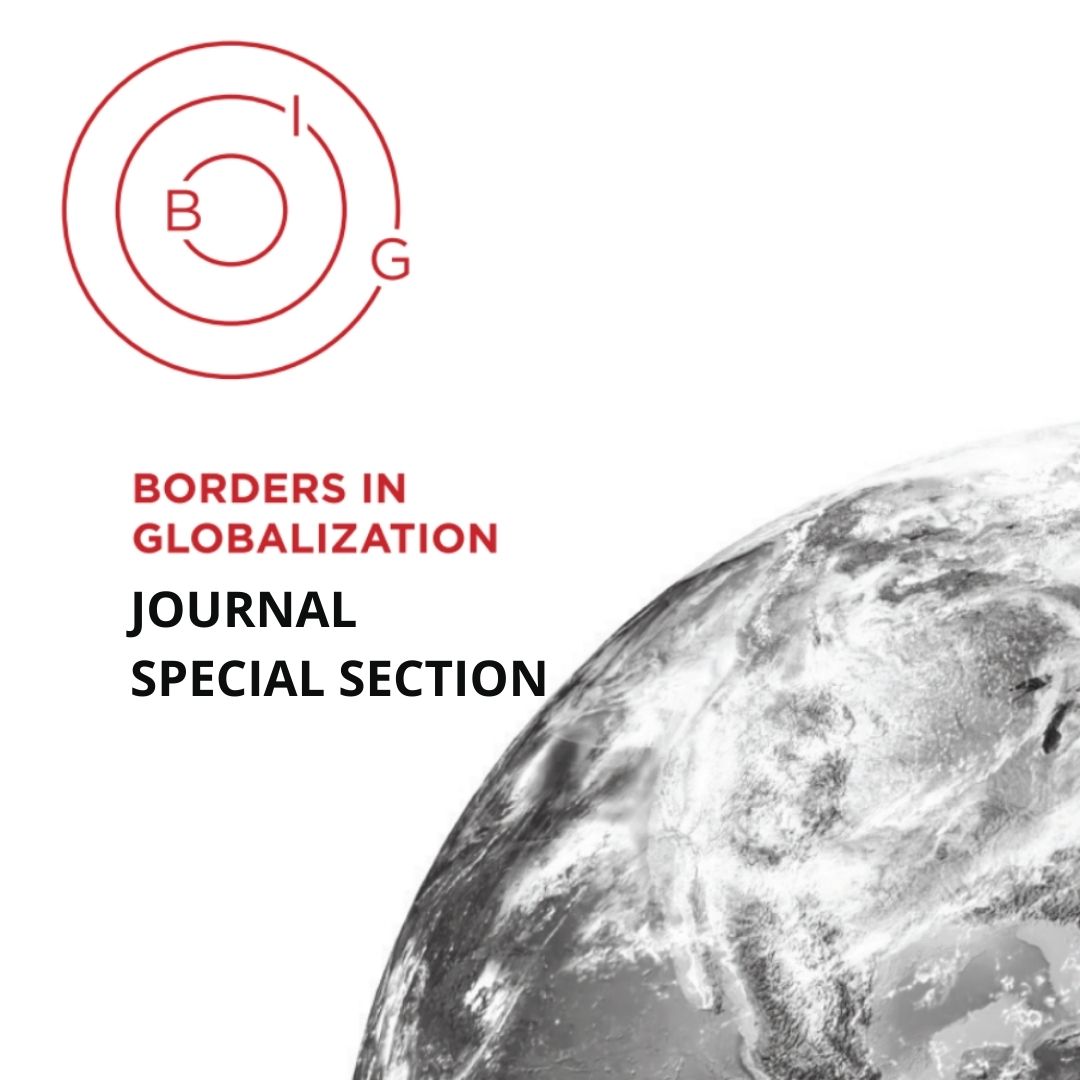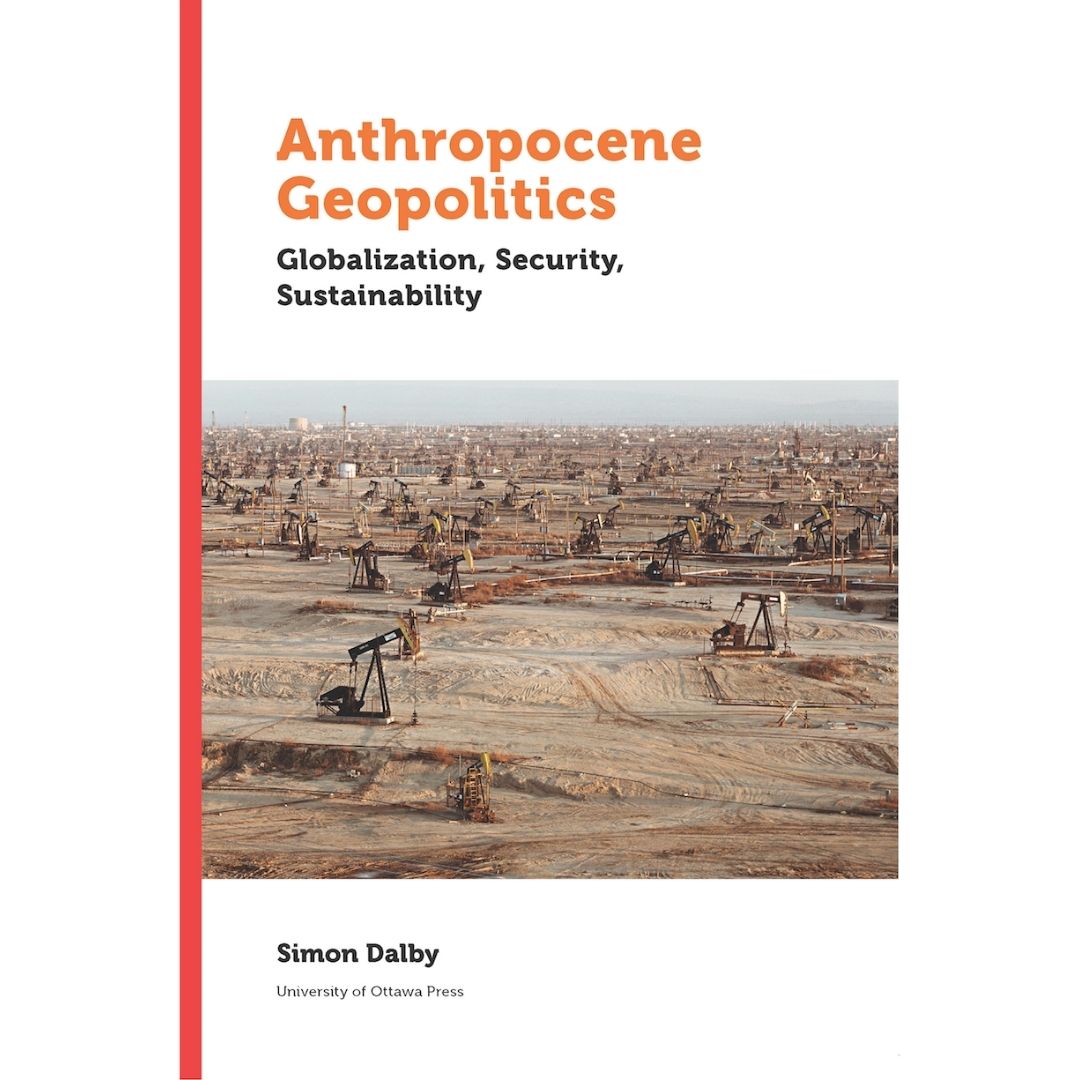Using Artificial Intelligence to Secure Global Trade and Identify Hidden Threats
with Peter Swartz (Chief Technology Officer, Altana AI)
In this dynamic discussion with Peter Swartz, Chief Technology Officer at Altana, explore how AI is transforming how border agencies detect risk, manage complex supply chains, and focus operational attention where it matters most.
What you’ll learn:
– How AI systems help identify illicit networks and hidden actors in global trade
– What it takes to implement AI in real-world border security environments
– How agencies can cut through information overload to act with precision
Details:
– Date: May 28, 2025
– Time: 1:00 PM PST (20:00 UTC)
– Location: Online (Microsoft Teams)
– Cost: Free

BIG Talk — Security. Cooperation. Governance.: The Canada–United States Open Border Paradox
Victoria, BC & Zoom | May 28, 2024
In Person: CFGS C168 (Sedgewick Building, University of Victoria) or Zoom. The meeting will take place from 12:00pm to 1:30pm PST. Register in advance for this meeting here. Registration is free but required.
Learn about a fascinating new open-access volume on Canada–US border and security policies: Security. Cooperation. Governance.: The Canada–United States Open Border Paradox (University of Michigan Press, 2023).
Join BIG Program Director Emmanuel Brunet-Jailly, co-editors Professors Christian Leuprecht and Todd Hataley, along with contributors Drs. Jamie Ferrill, Laurie Trautman, Geoffrey Hale, Heather Nicol, and Carolina Reyes Marquez for a conversation about managing and administering (one of) the world’s most successful, secure and prosperous cross-border relationships. In an age when politics often frames borders as a problem, this book posits key lessons from the Canada–US border on fostering bilateral and binational coordination, cooperation and collaboration.
Sectoral and geographic diversity of cross-border interdependence of the world’s largest bilateral trade relationship makes the Canada–US border a living laboratory for studying the interaction of trade, security, and other border policies that challenge conventional centralized approaches to national security. As state borders have evolved in ways that serve the interests of central governments in security and the regulation of trade, the webinar discusses border and security policies that have evolved from successive trade agreements since the 1950s, punctuated by new and emerging challenges to security in the twenty-first century.
This BIG_Talk is being delivered in partnership with the Institute for Intergovernmental Relations (IIGR) at Queen’s University. Learn more about the IIGR here.
“This book makes the case that a border is not a uniform dividing line between sovereign states but a series of interlinked channels between distinct communities. It is a unique piece of scholarship that demonstrates how border policies related to security, immigration, and trade are tied to regional preferences, mediated by federal and binational policymakers.”
— Laura Dawson, Executive Director of the Future Borders Coalition

Borders, Politics and Policies: Using Data to Power Border Research
Strasbourg, France | June 3–4, 2024
In collaboration with the Transfrontier Euro-Institut Network (TEIN, Kehl, Germany) and the Institute of Political Studies (Sciences Po Strasbourg, University of Strasbourg, France), Borders in Globalization is hosting an academic conference entitled ‘Borders, Politics, and Policies: Using Data to Power Border Research.’
The conference will be held in Strasbourg, France, on June 3rd and 4th, 2024. Conference Registration will be available at the end of March 2024.
The Jean Monnet Network ‘Human to Military Security Policies’ project takes as its premise that the ongoing migration crisis in Europe is the worst humanitarian crisis in decades and is forcing Europeans to face past and future issues about borders and security. The policy decisions being made now will have a long-standing impact on the European Union and are not only reshaping Europe’s internal and peripheral borders, but also Europe’s values of integration. Moreover, in this era of globalization, much of the policy process around humanitarian aid, migration, and security involve collaboration and cooperation across borders.
In light of this clear need for comparative, cross-border research, the Jean Monnet Network ‘Human to Military Security Policies’ project has been building a database, with the goal of collecting systematic and comprehensive data on European Integration across each internal and external border dyad from the perspective of human to military security in the EU. The database includes over 160 dyad pairs, where either one or both dyad countries is an EU member state. Data on a wide range of indicators and variables on the dyads covering all aspects of the human to security continuum, from defense spending to infrastructure continuity to tourism and trade.
More information on the databases projects is available here.

Special Section: Patterns in Border Security: Regional Comparisons
Commonwealth & Comparative Politics | Volume 59, Issue 4 | 2021
This special issue of Commonwealth & Comparative Politics raises the prospect of trust-based determinants of security communities other than cultural similarity. The case studies in this special issue document the emergence of cross-border and transgovernmental policy and enforcement networks that facilitate policy development, implementation and alignment through coordination, cooperation, and collaboration: nascent communities coordinate, ascendant communities coordinate and cooperate but struggle to collaborate, while mature communities coordinate, cooperate, and collaborate. Specifically, pluralistic forms of communication and interactions away from the actual borderline seem to play a key role in the emergence of friendly and trustful relationships among border dyads that need not necessarily be contiguous.
Contents
Foreword by Kunio Mikuriya
Introduction by Christian Leuprecht, Emmanuel Brunet-Jailly, Todd Hataley & Tim Legrand
The United States–Canada security community: a case study in mature border management by Christian Leuprecht, Todd Hataley, Kelly Sundberg, Keith Cozine & Emmanuel Brunet-Jailly
Security beyond the border: exploring Australia and New Zealand trans-Tasman relations in a globalised world by Jamie Ferrill, Germana Nicklin, Tim Legrand & Haydn McComas
Between triple borders: border security across Latin America’s Southern Cone by Adriana Dorfman, Rafael Francisco França & Julian Mokwa Felix
Border security management in the MENA region: models of nascent and ascendant coordination and cooperation by Daniel Meier
Border security in Africa: the paradigmatic case of the Sahel as the embodiment of security and economy in borderlands by Thomas Cantens
So similar yet so distant: border security management between India and Pakistan as a laboratory of non-experimentation by Dhananjay Tripathi
Funding
This work was supported by Social Sciences and Humanities Research Council of Canada [895-2012-1022].

Patterns in Border Security: Regional Comparisons
Christian Leuprecht, Todd Hataley, Emmanuel Brunet-Jailly | Routledge | 2022
How do security communities transform into security regimes? This book compares the construction of cross-border security regimes across five regions of the world to illustrate how trust emerges from the day-to-day relations of coordination, cooperation, or collaboration. Patterns in Border Security: Regional Comparisons studies the way borderland communities develop, implement, and align border policy to enhance their sense of security. Borders have been evolving rapidly in direct response to the multifaceted challenges brought on by globalization, which has had a nuanced impact on the way borders are governed and border security is managed. Taking a methodical comparative regional approach, this book identifies and contrasts determinants of nascent, ascendant, and mature border security regimes, which the book documents in seven regional case studies from across the globe. The findings identify conditions that give rise to cross-border and trans-governmental coordination, cooperation, or collaboration. Specifically, pluralistic forms of communication and interactions, sometimes far from the actual borderline, emerge as key determinants of friendly and trustful relations among both contiguous and non-contiguous regions. This is a significant innovation in the study of borders, in particular in the way borders mediate security. For six decades international security studies had posited culture as the bedrock of security communities. By contrast, the book identifies conditions, a method, and a model for adequate and effective cross-border relations, but whose outcome is not contingent on culture.
Editors:
Christian Leuprecht is Class of 1965 Professor in Leadership, Department of Political Science and Economics, Royal Military College of Canada; Director of the Institute of Intergovernmental Relations, School of Policy Studies, Queen’s University, Canada; Adjunct Research Professor, Australian Graduate School of Policing and Security, Charles Sturt University, Australia; and Munk Senior Fellow in Security and Defence at the Macdonald Laurier Institute. A former Fulbright Research Chair in Canada-US Relations at the School for Advanced International Studies at Johns Hopkins University in Washington, DC (2020) and a former Eisenhower Fellow at the NATO Defence College in Rome (2019), he is a recipient of RMC’s Cowan Prize for Excellence in Research and an elected member of the College of New Scholars of the Royal Society of Canada. He is Editor-in-Chief of the Canadian Military Journal.
Todd Hataley is Professor in the School of Justice and Community Development at Fleming College in Peterborough, Ontario, Canada; Adjunct Associate Professor at the Royal Military College of Canada; and a former Fulbright Research Chair in Canada-US Relations at Johns Hopkins University. He is a retired member of the Royal Canadian Mounted Police. During his tenure as a federal police officer, he conducted investigations into the smuggling of drugs, weapons and humans, money laundering, organized crime, national security, and extra-territorial torture investigations. His research focuses on managing of international boundaries, public safety, Indigenous policing, and transnational crime.
Emmanuel Brunet-Jailly is Professor in the School of Public Administration, Jean Monnet Chair and Director of the Jean Monnet Centre and the Borders in Globalization Laboratory at the University of Victoria, Canada. He is Editor of the Borders in Globalization Review.

#11 BIG Podcast – “Security of Borders and Security of Transnational Flows”
featuring Alan Bersin – Executive Chairman of Altana AI and former U.S. Commissioner of Customs and Border Protection
Transnational flows cross borders and reveal national and international security issues. New technologies such as BIG DATA, artificial intelligence and Machine Learning are mobilized to secure the movement and circulation of data, goods and people. Border lines are no longer the main place for checks and controls. It is this paradigm shift in the analysis and governance of borders that is the subject of our discussion with Alan D. Bersin.
Les flux transnationaux traversent les frontières et révèlent des enjeux de sécurité nationale et internationale. Les nouvelles technologies comme le BIG DATA, l’intelligence artificielle et le Machine Learning sont mobilisées pour sécuriser les mouvements et la circulation des données, des biens et des personnes. Les lignes-frontières ne sont plus le lieu principal des contrôles. C’est ce changement de paradigme dans l’analyse et la gouvernance des frontières qui fait l’objet de notre discussion avec Alan D. Bersin.
Listen on Apple Podcasts, Spotify, YouTube, and the Podcast App!

Firepower, Geopolitics and the Future: Rethinking Environmental Security
featuring Dr. Simon Dalby (BIG Senior Research Fellow)
This webinar was hosted virtually on Tuesday October 4, 2022. You can now watch the full presentation for free here!
The interconnected crises of energy, security and climate change require rethinking many aspects of modernity. The great power rivalries, accelerating climate related calamities and technological innovations reprise many of the themes first clearly articulated at the 1972 Stockholm United Nations Conference on the Human Environment. Half a century later the urgency of grappling with our predicament, of only having one earth, requires redoubled efforts to link across disciplines, and in particular across the divide between natural and social sciences. Innovative formulations such as the Anthropocene are obviously needed because perpetuating the modern social order based on firepower can no longer provide security. Instead strategies to facilitate adaptation and remove institutional blockages to rapid energy innovation are a key theme for policy makers, and likewise for researchers in numerous geosciences.
Simon Dalby is a Professor at Wilfrid Laurier University, Waterloo, Ontario, a Senior Fellow at the Centre for International Governance Innovation and Senior Research Fellow with the Borders in Globalization program at the University of Victoria’s Centre for Global Studies. He was educated at Trinity College Dublin, the University of Victoria and holds a Ph.D. from SimonFraser University. Prior to joining Wilfrid Laurier University he was Professor of Geography, Environmental Studies and Political Economy at Carleton University. He has served as co-editor of Geography Compass and Geopolitics journals, as the sustainability theme lead for the Borders in Globalization research program, and from 2012 to 2018 he was CIGI Chair in the Political Economy of Climate Change at the Balsillie School of International Affairs. He is coeditor of Reframing Climate Change (Routledge 2016) and Achieving the Sustainable Development Goals (Routledge 2019) and author of Anthropocene Geopolitics (University of Ottawa Press 2020), and Rethinking Environmental Security (Edward Elgar 2022). He has active research interests in the contemporary climate security discussion and the burgeoning debate about the Anthropocene and the implications of both for geopolitics and policy formulation.

Anthropocene Geopolitics: Globalization, Security, Sustainability
Simon Dalby | University of Ottawa Press | 2020
We now find ourselves in a new geological age: the Anthropocene. The climate is changing and species are disappearing at a rate not seen since Earth’s major extinctions. The rapid, large-scale changes caused by fossil-fuel powered globalization increasingly threaten societies in new, unforeseen ways.
But most security policies continue to be built on notions that look backward to a time when geopolitical threats derived mainly from the rivalries of states with fixed boundaries. Instead, Anthropocene Geopolitics shows that security policy must look forward to quickly shape a sustainable world no longer dependent on fossil fuels.
A future of long-term peace and geopolitical security depends on keeping the earth in conditions roughly similar to those we have known throughout history. Minimizing disruptions that would further put civilization at risk of extinction urgently requires policies that reflect new Anthropocene “planetary boundaries.”
Read Dr. Leonhardt van Efferink’s summary of Simon’s book on ExploringGeopolitics.org.

Climate Change, Security and Sustainability
Simon Dalby, Susan Horton, Rianne Mahon, Diana Thomaz | Achieving the Sustainable Development Goals: Global Governance Challenges | 2019
Violent conflict continues to plague many parts of the developing world, with mostly deleterious consequences for peoples and places where violence occurs. The complex relationships between organized violence and sustainable development affect the ability of states and other agencies to accomplish many of the Sustainable Development Goals (SDGs). In particular the discussion about Goal 13 on climate change now intersects with Northern security fears and policy responses that are sometimes seriously at odds with local drivers of environmental change. Contemporary analyses warn of “backdraft” effects if inappropriate policies aggravate rather than ameliorate conflict. Unravelling these complex interconnections is one key to the effective implementation of the SDGs agenda, one that is increasingly urgent as climate change accelerates, and appropriate policies are needed to deal with context-specific disruptions in many diverse places.
Dalby, Simon., Susan Horton, Rianne Mahon and Diana Thomaz. “Climate Change, Security and Sustainability.” Achieving the Sustainable Development Goals: Global Governance Challenges. Abingdon-on-Thames: Routledge, 2019.

